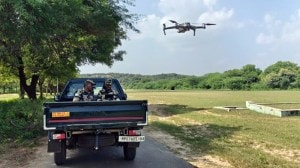Wary of ceasefire, BJP puts its meet on hold
To guard against any violation of the fragile ceasefire between the BJP leadership and RSS brass by loose cannons from either side, the BJP ...

To guard against any violation of the fragile ceasefire between the BJP leadership and RSS brass by loose cannons from either side, the BJP today decided to postpone its national executive meeting in Chennai, scheduled to begin on July 21.
It will now be held at the same venue from September 16-18, but whether it will be presided over by L.K.Advani or an RSS-backed ‘‘new generation’’ leader remains to be seen.
BJP deputy leader in the Lok Sabha V.K.Malhotra indicated as much when he told reporters that Advani ‘‘would remain both our president and Leader of the Opposition during the (Monsoon) Session.’’ The Monsoon Session of Parliament, beginning July 25, ends on August 26.
The official reason trotted out by Malhotra for postponing the Chennai meet was the ‘‘preparations for the coming session of Parliament.’’ BJP spokesman Prakash Javadekar came up with the explanation that ‘‘heavy rain’’ was expected in Chennai this week and, therefore, the meeting was postponed.
Party circles, however, said the real reason was the ‘‘ideological storm’’ in which the Parivar had been caught since Advani’s return from Pakistan.
Even before yesterday’s truce with the RSS, several BJP leaders were against holding the national executive session at a time when the party was divided on the leadership issue. But Advani himself was reportedly keen on the meeting being held, seeing it as an opportunity to clear the air and rally the party around him.
But after his meeting with RSS leaders at Jhandewalan last night, in which a ‘‘roadmap’’ was drawn up to ensure that the BJP kept its promise of carrying out the ‘‘necessary reforms’’ on ideology, conduct and leadership, Advani is believed to have realised that discretion was the better part of valour — at least for the time being.
With a number of senior BJP leaders threatening to raise the issues of ideology and the ‘‘one man—one post’’ principle at the Chennai meet, the BJP leadership feared that the national executive could bring out divisions in the open.
If Advani had decided to defy the RSS — as he had indicated by refusing to step down on July 11 — he could have used the occasion to fortify his position. Given his stature in the party, a majority of the 86-member national executive would not have challenged his leadership openly.
But after Sunday night’s developments, both Advani and the RSS decided to give each other time to implement the points in the ‘‘compromise’’ and avoid any showdown in the immediate future, sources said. Since ‘‘disgruntled elements’’ could have raised uncomfortable questions, the meeting was postponed.
Another reason was that the timing of the Chennai meet could hamper the BJP’s performance in Parliament. As it is, the inner wranglings in the Sangh Parivar has overshadowed whatever little attempts the BJP has made to play the role of the country’s principal opposition.
BJP leaders privately regret the fact that the CPI(M)-led Left contingent has been ‘‘enjoying the best of both worlds’’ — be part of the government and yet almost entirely occupy the opposition space. The continuing turmoil in the party, which was likely to come out in the open in Chennai, would have further obscured the BJP’s efforts to target the UPA.
The RSS too has agreed to the Atal-Advani contention that the ‘‘one man—one post’’ principle be shelved for the time being because implementing it right now would hamper Advani’s ability to play the role of the Leader of the Opposition in the House.
Both RSS and BJP members were tightlipped about the ‘‘timeframe’’ for a change of leadership in the BJP. There were hectic efforts from both sides to project a ‘‘business as usual’’ air today but sources confirmed that it will take a long while before the current ‘‘ceasefire’’ turns into ‘‘lasting peace.’’
Advani, sources said, is keeping his cards close to his chest and would like to wait for the outcome of the Bihar elections before making his next move. But the RSS too is in ‘‘wait and watch’’ mode and will ensure that its supremacy over the BJP is not questioned by Advani again, sources said.
Photos





- 01
- 02
- 03
- 04
- 05

























